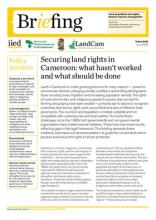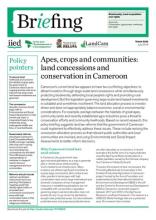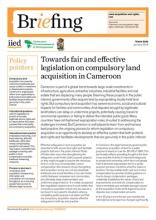Land Library Search
Through our robust search engine, you can search for any item of the over 73,000 highly curated resources in the Land Library.
If you would like to find an overview of what is possible, feel free to peruse the Search Guide.
/ library resources
Showing items 1 through 9 of 51.Land in Cameroon is under growing pressure for many reasons — powerful commercial interests, changing climate conditions and shifting demographic flows including mass migration and increasing population density.
Cameroon’s current land law appears to have two conflicting objectives: to attract investors through large-scale land concessions while simultaneously protecting biodiversity, defending local people’s rights and promoting rural development.
Cameroon is part of a global trend towards large-scale investments in infrastructure, agriculture, extractive industries, industrial facilities and real estate that are displacing many people.
From the mid-2000s, a commodity boom underpinned a wave of land use investments in low- and middle-income countries.
Article 11 shall be amended to add the following wording: “Transfer of forest land into other categories of land shall be prohibited in the following cases: (a) Group I forests; (b) Group II - protection of ecosystems in forests, except in specified cases; (c) in groups III - in forests of protec
Article 13 shall be amended to add the following wording: “Article 13. Flora and fauna management companies. 1.
This article reflects on the Tenure Guidelines as a tool for addressing resource governance challenges.
This Regional Law shall have as its purpose ensuring the right of citizens to favorable environment, including landscape and shade gardening, planting of recreational urban forests, thus ensuring favorable conditions for vital activity of citizens, and delimits plenary powers between city state b
This report draws on 10 case studies of recent large-scale land deals and aims to improve understanding of the investment chains that underpin the deals, and to identify ‘pressure points’ for effective public action to ensure that investments respond to local and national development agendas and







